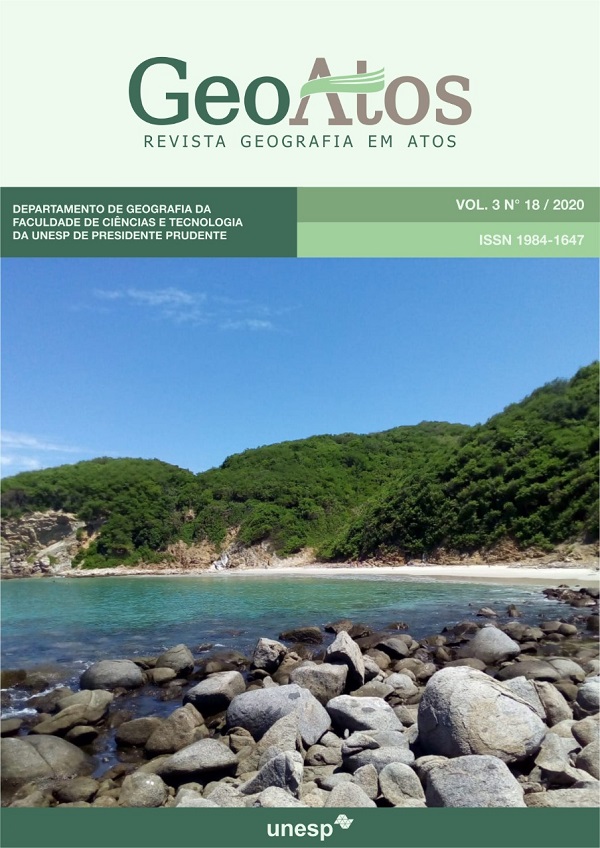Cartographie des concepts société et forêt tropicale: une perspective de ces cinq dernières années
DOI:
https://doi.org/10.35416/geoatos.v3i18.7107Resumo
La forêt tropicale et la société sont des concepts qui impliquent plusieurs domaines d'étude. Il en résulte des recherches approfondies qui portent souvent sur des questions environnementales, sociales, culturelles et politiques. La recherche bibliographique présentée dans cet article a pour objet de rassembler une base de référence existant dans la plateforme internationale Web of Science pour le développement de la recherche interdisciplinaire. Par le biais de l'utilisation théorique et conceptuelle, il a été possible d'établir des objectifs pour recenser les domaines de recherches et cartographier à l’aide du système d’information géographique (SIG) les principaux pays qui ont publiés des travaux dans la littérature actuelle. Au total, 242 articles scientifiques publiés au cours des cinq dernières années ont été analysés sur 15 thèmes liés à la forêt tropicale et à la société. Une brève évaluation a été effectuée de la façon dont ces concepts ont été incorporés dans les divers domaines d’études. Sur la base de la conception de cet article, basé sur une brève analyse bibliographique, il est conclu que les efforts de plusieurs domaines de recherches liés à ces concepts favorisent la diversité des études interdisciplinaires et mettent en évidence les pays qui évaluent les avantages et les problèmes courants des forêts tropicales. En outre, il met en lumière les interactions humaines avec la nature d'une plus grande pertinence qui peuvent être approfondies et mieux investies.
Downloads
Referências
AIDE, T. Mitchell et al. Deforestation and Reforestation of L atin A merica and the C aribbean (2001–2010). Biotropica, v. 45, n. 2, p. 262-271, 2013.
ALCÂNTARA, L. C. S.; SAMPAIO, C. A. C. Bem viver como paradigma de desenvolvimento: utopia ou alternativa possível? Desenvolvimento e Meio Ambiente, vol. 40, pp. 231-251, 2017.
ANGELSEN, A.; KAIMOWITZ, D. Introduction: the role of agricultural technologies in Tropical deforestation. In: Angelsen, A., Kaimowitz, D. (Eds.), Agricultural technologies and tropical deforestation. CABI Publishing, Wallingford, Oxon, UK, 2001.
ARAÚJO, R. F.; ALVARENGA, L. A bibliometria na pesquisa científica da pós-graduação brasileira de 1987 a 2007. Revista Eletrônica em Biblioteconomia e Ciência da Informação, vol. 16, no. 31, pp. 51-70, 2011.
BANKS-LEITE, C.; PARDINI, R.; TAMBOSI, L. R.; PEARSE, W. D.; BUENO, A. A.; BRUSCAGIN, R. T.; METZGER, J. P. Using ecological thresholds to evaluate the costs and benefits of set-asides in a biodiversity hotspot. Science, 2014.
BARBOSA, P.; LETOURNEAU, D. K.; AGRAWAL, A. A. Insect Outbreaks Revisited. In Insect Outbreaks Revisited, 2012.
BELTRAMINO, T. La Construcción Social De Las Inundaciones en Santa Fé (1982–83/2003). Naturaleza, Riesgo Y Sociedad. Revista INteruniversitaria de Estudios Territoriales, PAMPA, 2018.
CASTILLO, A.; VEGA-RIVERA, J. H.; PÉREZ-ESCOBEDO, M.; ROMO-DÍAZ, G.; LÓPEZ-CARAPIA, G.; AYALA-OROZCO, B. Linking social–ecological knowledge with rural communities in Mexico: lessons and challenges toward sustainability. Ecosphere, 2018.
CRONKLETON, P.; LARSON, A. M.; FEINTRENIE, L.; GARCIA, C.; LEVANG, P. Reframing Community Forestry to Manage the Forest-Farm Interface. Small-Scale Forestry, 2013.
DAVIDSON, Eric A. et al. The Amazon basin in transition. Nature, v. 481, n. 7381, p. 321, 2012.
DIRZO, R., YOUNG, H. S., GALETTI, M., CEBALLOS, G., ISAAC, N. J. B., & COLLEN, B. Defaunation in the Anthropocene. Science, 2014.
DURY, M.; MERTENS, L.; FAYOLLE, A.; VERBEECK, H.; HAMBUCKERS, A.; FRANÇOIS, L. Refining species traits in a dynamic vegetation model to project the impacts of climate change on tropical trees in Central Africa. Forests, 2018.
DUTRIEUX, L. P.; VERBESSELT, J.; KOOISTRA, L.; HEROLD, M. Monitoring forest cover loss using multiple data streams, a case study of a tropical dry forest in Bolivia. ISPRS Journal of Photogrammetry and Remote Sensing, 2015.
FIGUEIREDO, R. A.; DE ALCÂNTARA, L. C. S.; MORAIS, J. P. G.; DE SAIS, A. C.; OLIVEIRA, R. E. DE. Resiliência em sistemas socioecológicos, paisagem rural e agricultura. Revista Cincia, Tecnologia & Ambiente, 2017.
FREITAS, F. L. M.; ENGLUND, O.; SPAROVEK, G.; BERNDES, G.; GUIDOTTI, V.; PINTO, L. F. G.; MÖRTBERG, U. Who owns the Brazilian carbon? Global Change Biology, 2018.
GARIBALDI, L. A.; CARVALHEIRO, L. G.; VAISSIÈRE, B. E.; GEMMILL-HERREN, B.; HIPÓLITO, J.; FREITAS, B. M.; … ZHANG, H. Mutually beneficial pollinator diversity and crop yield outcomes in small and large farms. Science, 2016.
GAVIN, M. C.; ANDERSON, G. J. Socioeconomic predictors of forest use values in the Peruvian Amazon: A potential tool for biodiversity conservation. Ecological Economics, 2007.
GIBSON, L.; LEE, T. M.; KOH, L. P.; BROOK, B. W.; GARDNER, T. A.; BARLOW, J.; … SODHI, N. S. Primary forests are irreplaceable for sustaining tropical biodiversity. Nature, 478(7369), 378–381, 2011.
GOLUB, A.; LUBOWSKI, R.; PIRIS-CABEZAS, P. Balancing Risks from Climate Policy Uncertainties: The Role of Options and Reduced Emissions from Deforestation and Forest Degradation. Ecological Economics, 2017.
GRIFFITHS, P.; JAKIMOW, B.; HOSTERT, P. Reconstructing long term annual deforestation dynamics in Pará and Mato Grosso using the Landsat archive. Remote Sensing of Environment, 2018.
HECHT, S. B. Forests lost and found in tropical Latin America: the woodland ‘green revolution.’ The Journal of Peasant Studies, 41(5), 877–909, 2014.
HERRERA, P.; SUÁREZ, J. P.; SÁNCHEZ-RODRÍGUEZ, A.; MOLINA, M. C.; PRIETO, M.; MÉNDEZ, M. Many broadly-shared mycobionts characterize mycorrhizal interactions of two coexisting epiphytic orchids in a high elevation tropical forest. Fungal Ecology, 2019.
JANZEN, D. H.; HALLWACHS, W. Perspective: Where might be many tropical insects? Biological Conservation, 2019.
JOLY, C. A.; SCARANO, F. R.; BUSTAMANTE, M.; GADDA, T.; METZGER, J. P.; SEIXAS, C. S., … SANTOS, I. DE L. Sumário para tomadores de decisão: 1o diagnóstico brasileiro de biodiversidade e serviços ecossistêmicos. In Sumário para tomadores de decisão: 1o diagnóstico brasileiro de biodiversidade e serviços ecossistêmicos, 2018.
LARSON, A. M.; PACHECO, P.; TONI, F.; VALLEJO, M. Trends in Latin American forestry decentralisations: legal frameworks, municipal governments and forest dependent groups. International Forestry Review, 2007.
LE QUEBEC GEOGRAPHIE, 2008. Disponível em :< https://quebecgeographique.gouv.qc.ca/education/geographique.asp>. Accesso em : 15 dez. 2019.
LESCUYER, G. ; EMERIT, A. Utilisation de l’outil cartographique par les acteurs locaux pour la gestion concertée d’une forêt au sud du cameroun. Agricultures (Montrouge), 2005.
LUI, G. H.; MOLINA, S. M. G. Ocupação Humana e Transformação Das Paisagens Na Amazônia Brasileira. Amazônica - Revista de Antropologia, 2016.
LUZ, A. C.; PANEQUE-GÁLVEZ, J.; GUÈZE, M.; PINO, J.; MACÍA, M. J.; ORTA-MARTÍNEZ, M.; REYES-GARCÍA, V. Continuity and change in hunting behaviour among contemporary indigenous peoples. Biological Conservation, 2017.
MARENGO, J. A.; SOUZA, C. M.; THONICKE, K.; BURTON, C.; HALLADAY, K.; BETTS, R. A.; … SOARES, W. R. Changes in Climate and Land Use Over the Amazon Region: Current and Future Variability and Trends. Frontiers in Earth Science, 2018.
MARINHO, F.; OEHL, F.; DA SILVA, I. R.; COYNE, D.; VERAS, J. S. DA N.; MAIA, L. C. High diversity of arbuscular mycorrhizal fungi in natural and anthropized sites of a Brazilian tropical dry forest (Caatinga). Fungal Ecology, 2019.
MAZÓN, M.; AGUIRRE, N.; ECHEVERRÍA, C.; ARONSON, J. Monitoring attributes for ecological restoration in Latin America and the Caribbean region. Restoration Ecology, 2019.
METZGER, J. P.; BUSTAMANTE, M. M. C.; FERREIRA, J.; FERNANDES, G. W.; LIBRÁN-EMBID, F.; PILLAR, V. D.; … OVERBECK, G. E. Why Brazil needs its Legal Reserves. Perspectives in Ecology and Conservation, 2019.
MUENCHOW, Jannes; SCHÄFER, Susann; KRÜGER, Eric. Reviewing qualitative GIS research—Toward a wider usage of open-source GIS and reproducible research practices. Geography Compass, 2019.
NGOMA, H.; ANGELSEN, A. Can conservation agriculture save tropical forests? The case of minimum tillage in Zambia. Forest Policy and Economics, 2018.
NOBRE, C. A.; SAMPAIO, G.; BORMA, L. S.; CASTILLA-RUBIO, J. C.; SILVA, J. S.; CARDOSO, M. Land-use and climate change risks in the amazon and the need of a novel sustainable development paradigm. Proceedings of the National Academy of Sciences, v. 113, n. 39, p. 10759-10768, 2016.
NOGUEIRA, R. J. B.; OLIVEIRA NETO, T. Federalismo e meio ambiente na amazonia: áreas protegidas como nova geografia política. L’Espace Politique, (31), 2017.
OCHOA-QUINTERO, J. M.; GARDNER, T. A.; ROSA, I., DE BARROS FERRAZ, S. F.; SUTHERLAND, W. J. Thresholds of species loss in Amazonian deforestation frontier landscapes. Conservation Biology, 2015.
OERKE, E.-C. Crop losses to pests. The Journal of Agricultural Science, v. 144, n. 1, p. 31-43, 2006.
OSTROM, Elinor. A general framework for analyzing sustainability of social-ecological systems. Science, v. 325, n. 5939, p. 419-422, 2009.
PACHECO, Pablo. Smallholder livelihoods, wealth and deforestation in the Eastern Amazon. Human Ecology, v. 37, n. 1, p. 27-41, 2009.
PASCUAL, Unai et al. Valuing nature’s contributions to people: the IPBES approach. Current Opinion in Environmental Sustainability, v. 26, p. 7-16, 2017.
PFEIFER, M.; LEFEBVRE, V.; PERES, C. A.; BANKS-LEITE, C.; WEARN, O. R.; MARSH, C. J.; EWERS, R. M. Creation of forest edges has a global impact on forest vertebrates. Nature, v. 551, n. 7679, p. 187, 2017.
PHELPS, J.; WEBB, Edward L.; AGRAWAL, A. Does REDD+ threaten to recentralize forest governance?. Science, v. 328, n. 5976, p. 312-313, 2010.
PIMM, Stuart L.; JENKINS, C. N.; ABELL, R.; BROOKS, T. M.; GITTLEMAN, J. L.; JOPPA, L. N.; SEXTON, J. O. The biodiversity of species and their rates of extinction, distribution, and protection. Science, v. 344, n. 6187, p. 1246752, 2014.
PRADO CÓRDOVA, J. P.; WUNDER, S.; SMITH-HALL, C.; BÖRNER, J. Rural income and forest reliance in highland guatemala. Environmental Management, v. 51, n. 5, p. 1034-1043, 2013.
PRĂVĂLIE, Remus. Major perturbations in the Earth's forest ecosystems. Possible implications for global warming. Earth-Science Reviews, v. 185, p. 544-571, 2018.
PYHÄLÄ, A.; BROWN, K.; ADGER, W. N. Implications of livelihood dependence on non-timber products in Peruvian Amazonia. Ecosystems, v. 9, n. 8, p. 1328-1341, 2006.
REYER, C. P. O.; ADAMS, S.; ALBRECHT, T.; BAARSCH, F.; BOIT, A.; CANALES TRUJILLO, N.; THONICKE, K. Climate change impacts in Latin America and the Caribbean and their implications for development. Regional Environmental Change, v. 17, n. 6, p. 1601-1621, 2017.
ROCKSTRÖM, J.; GAFFNEY, O.; ROGELJ, J.; MEINSHAUSEN, M.; NAKICENOVIC, N.; SCHELLNHUBER, H. J. A roadmap for rapid decarbonization. Science, v. 355, n. 6331, p. 1269-1271, 2017.
WOLOWSKI, M. et al. Sumário para tomadores de decisão: 1. relatório temático sobre polinização, polinizadores e produção de alimentos no Brasil. Campinas, 2018. ZENTENO, Mario et al. Livelihood strategies and forest dependence: New insights from Bolivian forest communities. Forest Policy and Economics, v. 26, p. 12-21, 2013.









